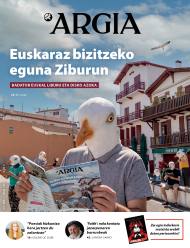“The complicity of speaking in Basque with Basque patients emerges immediately”
- He is only 26 years old and lives his work with the illusion of youth. Midwife at the public hospital in Baiona. “The first day I arrived late and they told me that, as it was, the indefinite contract was won, because many others occurred to them,” he confesses to us with a cry of laughter. Fortunately, in Lapurdi, Zuberoa and Baja Navarra, the meeting of Basques in health care is more common than expected.

Why the midwife?
As Lyceum students we have to choose a trade to be able to do a training of a couple of weeks. I didn't know what to do, but it was clear that I wanted to act in the care setting. We held a meeting with the counselor about personal tastes and I got out doctors, midwives, nurses... In her day, for me the midwife role was a great mystery and everything that was going around. This mystery intrigued me, and I became a midwife. In the case of France, in addition, we must do the first year of medicine; after the competition and after overcoming it all the doors are opened for further learning. In the case of midwives, they were four more years old. Today I think there are six.
Remember the first day of work?
Yes, and I will never forget! I was late on the first day and they told me that, thus, the indefinite contract had a profit, because many others occurred to them. I've been around for three years now, and I still have the same initial illusion. Because there is no day like that. I'm working in the delivery room, a moment has nothing to do with what's coming. From tranquility we can move quickly to the emergency situation or vice versa. We can be calm and suddenly put six women on the road to childbirth. It is a work of great intensity. I love it. Arriving in the morning and not knowing what will happen. We have twelve hour work shifts and I do everything.
It has been in a state of pandemic for three years.
.jpg) Yes, it can be said that I have hardly known “normality” or times without protocol. The last few months have been long and difficult; as in most professions, we too have had to adapt. Of course, we have had different phases. At first it was terror, we felt lost, it was very difficult to comply with the protocols. In Baiona, moreover, the situation was not so serious due to COVID-19. In December 2021, however, we changed the situation and began to overwhelm ourselves.
Yes, it can be said that I have hardly known “normality” or times without protocol. The last few months have been long and difficult; as in most professions, we too have had to adapt. Of course, we have had different phases. At first it was terror, we felt lost, it was very difficult to comply with the protocols. In Baiona, moreover, the situation was not so serious due to COVID-19. In December 2021, however, we changed the situation and began to overwhelm ourselves.
Moreover, before the pandemic, midwives began to strike to improve our working conditions. We have achieved a wage increase, but that is not all, let alone when we talk about health. In Baiona, for example, there are six speakers. There are three midwives of day and two of night. Major French cities face much worse situations. However, we go to the head and we will continue to strike until we get what we need.
You're increasingly Basque at the public hospital in Baiona!
Yes, we are many, we are more and more. For me, as a Basque, speaking in Basque with colleagues is a pleasure. When Basque women come to childbirth and see that I have a Basque name, they look at me with a special look. And then I start talking in Basque. So something special arises. I think you get more intimacy. Only speaking in Basque generates closeness, confidence and complicity quickly. When we talk about French, it's different. I do not mean that it is worse, or that I am not comfortable, but everything I mentioned has come later.
It is a young working group besides Baiona, which besides being Euskaldunes, is learning in Basque.
What do you feel when a woman gives birth?
It's very difficult to explain. Management is not easy either. When I was a rookie, I was scared. I didn't know what to say and how to do it. Natural births made me very strong, but I learned and it's very beautiful. We ask what it needs. I observe and act accordingly. I learn every day. Every woman is a world. Some ask for presence and others just want to be in their world.
In addition, I would say that those who want natural childbirth often come very prepared. Ready to accompany us.
Obstetric violence is currently mentioned. How do you experience the issue?
I have heard something about it, but I do not feel identified with it. I don't know anyone that childbirth has been like this. In the north, liberal midwives work hard preparing their women for childbirth. It's almost personalized assistance. In the delivery room, on the contrary, we listen and we are to meet the demand of the person, depending on the circumstances. People get informed and have fun. As soon as we were born, we gave the mother the ticket and we refused. Those moments are magical and in a house you do not live every day! We also learn to be quiet.
Emagin Gasna
The Urruans are authentic. It cannot be said otherwise. Those in Urruña are the best carnivals, those in Urruña are the best, those in Urruña are the best friends… You can follow and follow. “The tour between us always has fun, it’s very nice,” says Aramendi without hair. Whoever knows Urruña knows that it is a special wind. She thinks that in addition to working as a midwife, the midwife goes to the hospital to sell gas. His companions are the great and faithful customers of the gas he does with his partner. Children or gas, their passion is creation.
Until her final stage, the linguist Carmen Junyent claimed the possibility of dying in Catalan. When she died, she wrote her experiences with the health staff and asked to be published after her death. In this way, he wanted to emphasize that language is part of the treatment of... [+]



















